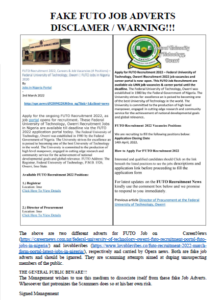The Federal University of Technology, Owerri, was established in 1980 primarily to ensure the technological development of Nigeria. The University has pursued this mandate with vigour. The School of Management Technology has programmes in Project Management Technology, Financial Management Technology, Information Management Technology, Maritime Management Technology, Transport Management Technology, and Management Technology.
Technology is the central and most significant element for effective operations management in today’s organizations. It is a body of knowledge used to create tools, develop skills, extract or collect materials that would substantially reduce human labour and significantly enhance the wellbeing of people. It is also the application of science (the combination of scientific methods and materials) to meet an objective or solve a problem. Therefore, Management Technology is the integration of policies and practices, organisational and leadership theories, communication processes and deployment of technological advances in the context of organisational growth and development. The undergraduate B. Tech. curriculum in Management Technology is the creative and innovative activities designed to expose students to learning experiences that would position them adequately for managerial tasks in public and private sector organisations. Management Technology is a multidisciplinary programme that prepares managers in organisations to manage their technological fundamentals to create competitive advantage. It involves integrated planning, design, optimization, operation and control of technological products, processes and services.
Furthermore, humanity is facing numerous environmental, social, economic, political, health, educational, conflict/war, religious and poverty challenges. This is where management comes in because the real difference between an organisation that achieves its goals efficiently and effectively and the other that fails to do the same is management. The short and long term devastating consequences hitherto facing humanity make the training of the 21st-century managers very imperative. This revision has, therefore, become very necessary to ensure that; (1) the science, technology and engineering components of the curriculum are satisfied and (2) students are exposed to knowledge, skills and tools needed in the 21st-century knowledge economy.


